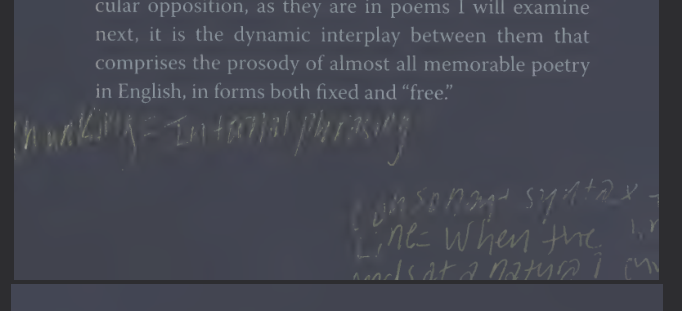created, $=dv.current().file.ctime & modified, =this.modified
tags: Syntax Literature Song Sentence
rel: Lyrics The Flexible Lyric Essays by Ellen Bryant Voigt
NOTE
The following pages investigate some of the ways a poet composes with and against and inside the syntactical patterns available in English.
Language Literacy and Literature
rel: Things about Eva I didn’t realize
Of a toddler:
After counting out three of the beans on her plate, Emily burst into a little aria “fourfivesixseveneight.” She doesn’t actually count that high: the string of sounds belongs not yet to meaningful speech but to song.
Chunking is a normal widespread brain function essential to what we think of human intelligence and memory.
Thought
A core realization with my niece Eva is that in evaluating her development, and the “flaws” and “inadequacies” of a developing child, I see that I am not much more developed. My understanding of things is only slightly more developed, often still paired with “song” in place of understanding. It’s this reason that actually understanding simple things comes to me as profound. I had always assumed to understand, but it was just a superficial song I sang.
Sentence - To say as most dictionaries and grammar books do, that a sentence provides complete thought, is actually to say that it resolves the brain’s search for the fundament. That is, every complete English sentence contains both a subject and a predicate. Whether the fundament is amplified with other chunks of linguistic information, its presence alone creates a clause.
Thought
Some overlap with The Flexible Lyric Essays by Ellen Bryant Voigt thoughts. I wonder if this is the root of my appreciation of the fragment in Sentence Swelling, Praise of Fragments. I don’t want the search to end.
The Sentence and the Line
Meter organizes small groups of notes, and sometimes larger ones, and thereby provides a sort of grid upon which music is drawn. On the other hand, phrasing imparts a kind of narrative to music. Broadly speaking, meter organizes musical time on the small scale, and phrasing organizes it on a large scale - yet the two kinds of rhythm are not entirely at peace with one another.
Like the musical measure, the poetic line is inherently artificial, imposed by the poet onto the language. The Lineation can mark - signal - the chunks on which phrasing depends. In free verse too, the poet continually negotiates the extent to which the two rhythmic systems will be “at peace with one another.” That is, whether a line will be primarily consonant with the syntax, parsing it, or dissonant, in counterpoint.
My scanned copy had ghostly marks here Marginalia which I am storing.

Meter and Phrase
Frost:
A sentence is not interesting merely in conveying a meaning of words. It must do something more: it must convey a meaning by sound.
Frost claimed in letters that he was never more pleased when he could get the two into strained relation, insisting on the importance of vernacular, a poet’s need to catch sentence sounds from fresh talk.
NOTE
Does this impose a shelf life on the effectiveness of a poem, as language shifts? We have older poems of earlier English that are difficult to parse without aid and study. “Fresh talk” comes to those inhabiting the present, and is gone.
What language must you write in, to be ever “fresh”? Can you make something that is persistently contemporary?
The classics.
On the Grid
Frost
The surest way to reach the heart of the reader is through the ear. The visual images thrown up by a poem are important, but it is more important still to chose and arrange words in a sequence so as virtually to control the intonations and pauses of the reader’s voice. By arrangemnt and choice of words on the part of the poet, the effects of humor, pathos, hysteria, anger and in fact, all effects, can be indicated or obtained.
The Trees by Philip Larkin
The trees are coming into leaf Like something almost being said; The recent buds relax and spread, Their greenness is a kind of grief.
Is it that they are born again And we grow old? No, they die too. Their yearly trick of looking new Is written down in rings of grain.
Yet still the unresting castles thresh In fullgrown thickness every May. Last year is dead, they seem to say, Begin afresh, afresh, afresh.
Off the Grid
Is all of this intended by the poet? The truthful answer is a “yes and no.” It’s probably not often an authentic poem of “felt thought” emerges solely from a willfulness intent on all the effect identified.
The making of a poem is not a performance but an adventure, an act of discovery. Most poets of high formal appetite often do perceive in advance of the concrete materials of the poem, some shape or heft or tone set of means.
According to Jourdain “phrasing imparts a kind of narrative to music. It is the mechanism by which a composition can play out a grand drama”